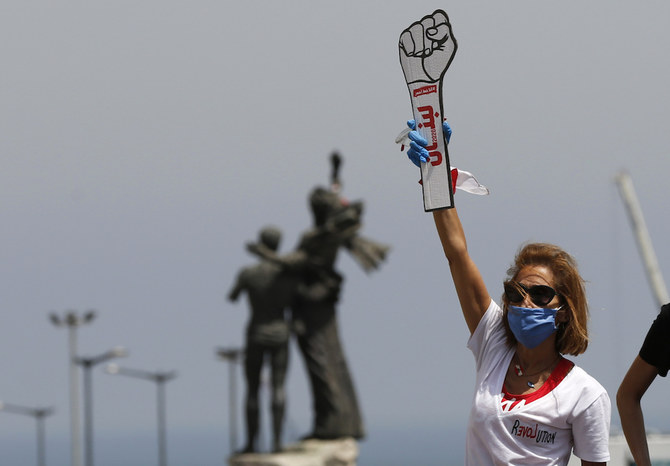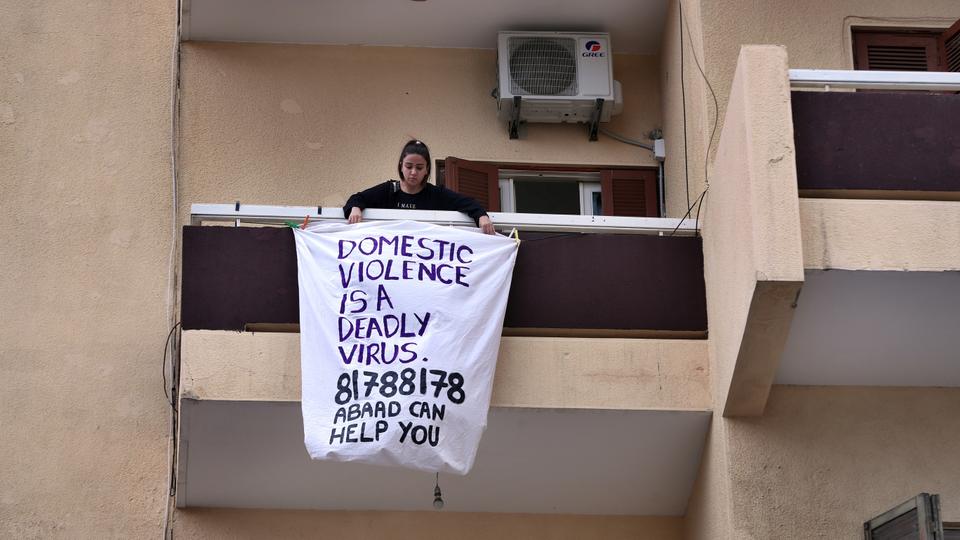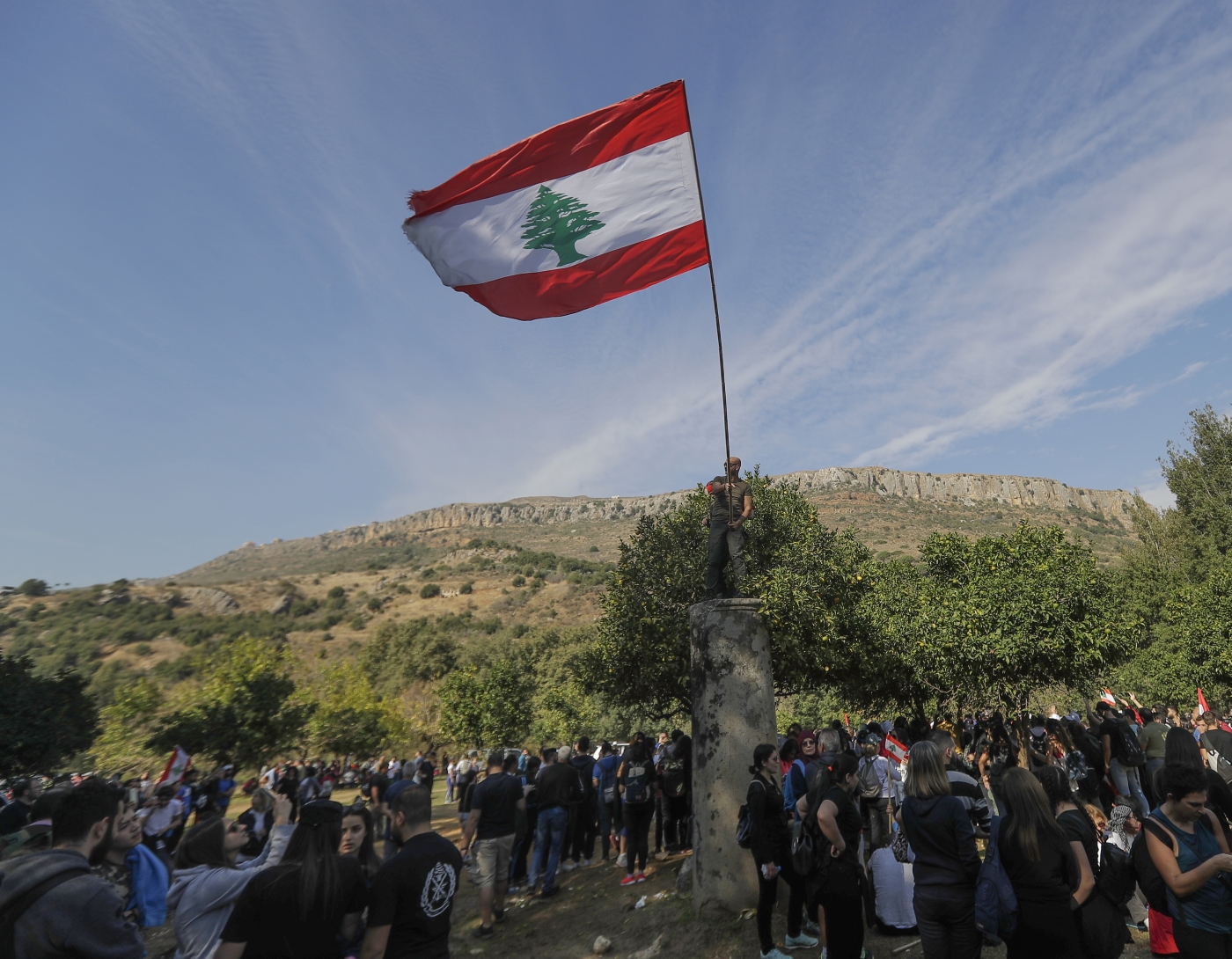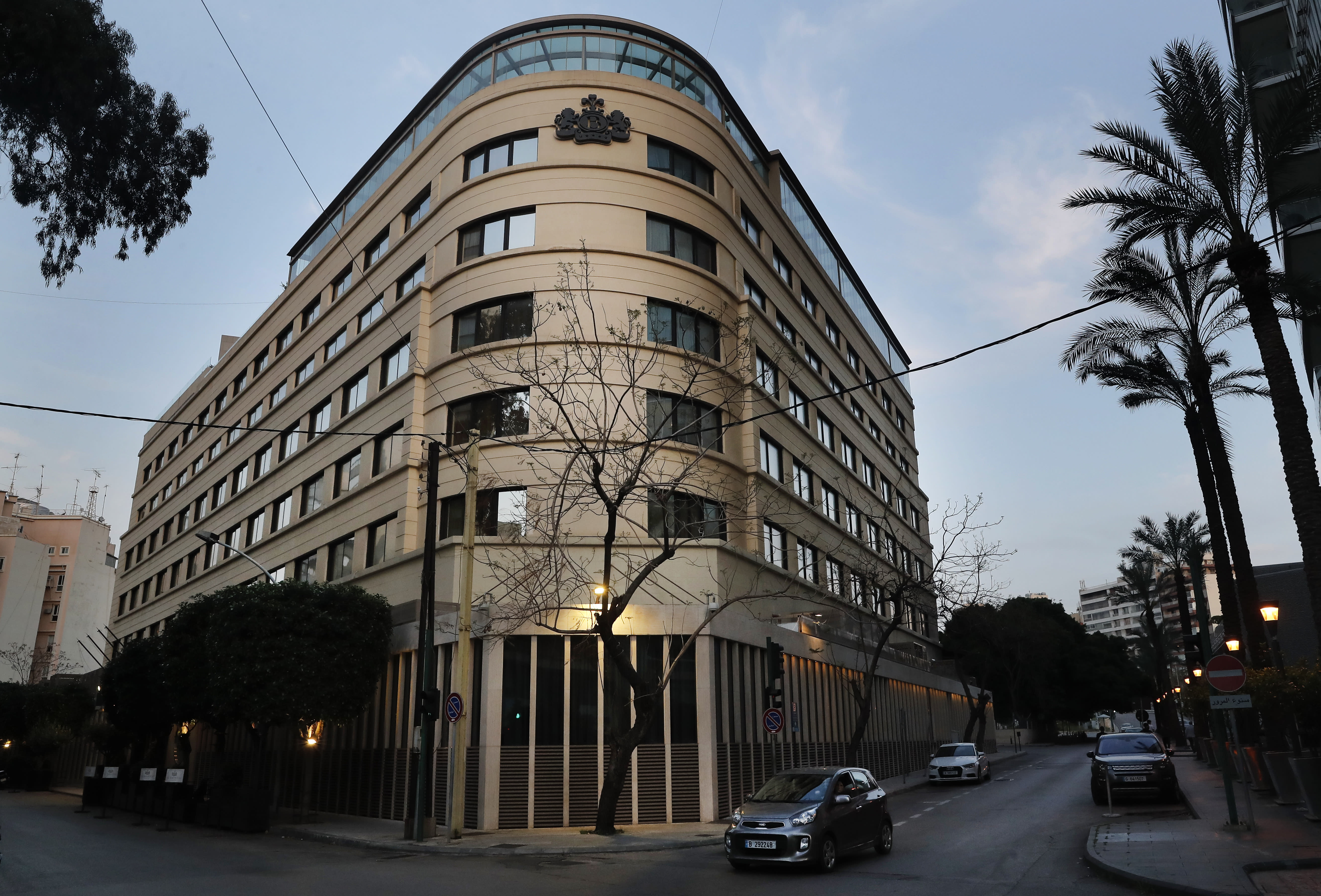by aawsat.com — Lebanon’s government needs to enact a rescue plan that rebuilds confidence in the economy and tackles root causes behind the country’s financial crisis, a senior International Monetary Fund official said in comments published on Wednesday. “The priority for the IMF is the need for the government to approve a rescue plan that […]

by arabnews.com — NAJIA HOUSSARI — BEIRUT: The Lebanese Parliament convened for the third time this week on Wednesday as dozens of protestors again took to the streets in their cars to raise their concerns about rising poverty and hardships amid the COVID-19 lockdown. Parliament dropped the expedited status of a proposed law to waive the immunity of presidents and ministers and returned it to parliamentary committees “for further study, to secure the independence of the judiciary and its constitutional right to trial.” Parliament also rejected a bill proposing that — in line with demands of protestors for the past six months — the current parliamentary term be shortened and elections held as soon as possible, and another bill proposing the suspension of public works in order to focus on the construction of the Bisri Dam. The dam has been strongly opposed by the civil movement, residents of mountainous areas, and environmental activists. Parliament did approve a proposed law put forward by MP Paula Yacoubian to ban pictures and posters of political leaders, officials, and employees in public places. Prime Minister Hassan Diab announced his approval of this move, while Progressive Socialist Party bloc MP Hadi Abou Hassan said, “It is implementation that matters.”
Independent MP Michel Moawad suggested that the law should also apply to “posters of religious figures and party flags,” referring to Hezbollah. A number of MPs attempted to address Lebanon’s ongoing economic and social crisis, which has been exacerbated by the COVID-19 pandemic. They warned of possible civic unrest and of the possibility of a greater collapse of the Lebanese lira against the dollar. A number of MPs also enquired about the fate of misappropriated funds. Parliament Speaker Nabih Berri responded that the government “has completed its promised economic plan, and Parliament will soon discuss it.” After the legislative session, Diab said the government’s reform plan would be discussed next week.
The civil movement continued its car-bound protests for the second day in succession — obeying the social-distancing guidelines — but protestors were unable to get close to where the legislative session was held. The Ministry of Health reported five new COVID-19 cases, including two in Rayak in the Bekaa Valley, which brought the total number of cases in Lebanon to 682. One patient from Dinniyeh in northern Lebanon with underlying health issues died bringing the number of COVID-19-related deaths to 22.
by AP — BEIRUT: A gunman shot dead nine people Tuesday, including five Syrians, and left their bodies in several locations in a mountain village southeast of the capital Beirut, the prime minister and state news and said. A motive for the killings was not immediately known, said the state-run National News Agency. It said […]


by thenational.ae — Sunniva Rose — Protests resumed across Lebanon on Tuesday despite confinement measures, as legislators met for a three-day session. Demonstrators and parliamentarians obeyed social-distancing rules as Parliament met for the first time since anti-government demonstrations swept the country last October. Protesters wearing gloves and masks drove in convoys around Beirut and MPs moved to a huge theatre called the Unesco Palace to let members sit further apart. These were the first protests in Beirut since confinement measures were imposed, despite sporadic demonstrations outside the capital in the past weeks as Lebanon’s financial crisis worsens. “People are very angry,” said Dania, a protester who was driving in Beirut’s convoy of about 50 cars, waving a Lebanese flag through her sunroof. “All of us, the poor and the rich, have lost half of our fortune.”
The value of the local currency has plummeted from the official rate of 1,507.5 to 3,250 against the US dollar on the grey market. Signs of a cash crunch appeared last summer and Lebanon defaulted on its foreign debt for the first time, in early March. “We want to make a statement to tell the government and political parties that we are here and we are coming back,” said Khodor Eido, who lost his job as a chef after restaurants closed last month over fears of Covid-19. “MPs have been on a paid vacation and are not looking after their people. “Prices of products in supermarkets are going up by 60 to 70 per cent and the economy minister says it’s normal because the rate of the dollar is increasing fast.” Protesters said they would keep demonstrating until Thursday, despite recent government efforts to restrict traffic by introducing a system that allows cars on the road only every other day.
by NAJIA HOUSSARI — arabnews.com —BEIRUT: Protesters in Lebanon have defied curfews and lockdowns and taken to the streets again — some demanding permission to reopen their shuttered businesses, others complaining that the pandemic had worsened their already-desperate financial plight. Barbers and other shop owners held a sit-in in Tripoli, asking the government to allow […]
by alaraby.co.uk — Joe Macaron — The Trump Administration quietly pulled a political and legal coup in Beirut in the short period between the Lebanese government’s declaration of a health state of emergency on March 15 and its banning of all flights on March 19 due to the coronavirus outbreak in the country. After six months of detention in Lebanon, the Lebanese-American citizen Amer Fakhoury was released and evacuated from Lebanon in a quasi-clandestine operation, one that reflected the leverage Washington has in Beirut and the vulnerabilities of a Lebanese government struggling for political and financial survival. Dubbed “the butcher of Khiam” by Lebanese media, Fakhoury was arrested as he arrived at Rafic Hariri International Airport in Beirut in September 2019. The General Directorate of General Security issued a statement on September 13 noting that during his interrogation, Fakhoury confessed to collaborating with the Israeli army and that he was subsequently referred to the Lebanese military’s office of the public prosecutor. Fakhoury, 57, was a senior warden in the infamous Khiam prison in south Lebanon that was run by the so-called South Lebanon Army, a militia group of Lebanese soldiers who had defected and then collaborated with Israel after its 1982 invasion of Lebanon. In 1985, the Israeli army turned the former Khiam military base into a prison camp that detained and tortured Lebanese who defied the Israeli occupation. Just before Israeli forces withdrew from Lebanon in 2000, Fakhoury fled to Israel then immigrated to the United States. He now holds both US and Israeli passports.
The controversy after Fakhoury’s arrest revolved around who removed his name from the blacklist of those convicted in Lebanese courts for collaborating with Israel, a list that is typically disseminated to all border entry points. It appears that his conviction in absentia in 1998 for 15 years of hard labor in prison was rescinded. Fakhoury’s family claims that Lebanese authorities “signed off” on his travel to Beirut. The most likely scenario might have been that high-level Lebanese officials were aware and played a role in removing Fakhoury’s conviction and arrest warrant from his criminal record to facilitate his visit. However, things went wrong the moment he landed in Beirut.

This is an opinion article and may not necessarily represent khazen.org views
by thearabweekly.com — Khairallah Khairallah — The Lebanese only want to know one thing: When will banks release their hold on people’s deposits? It’s not just a question of freeing Lebanese and Arab deposits, but also of playing with the country’s fate. Of course everybody is now busy with the COVID-19 pandemic, but the Lebanese are also worried about the future of their country, not knowing if it can survive if its banking system collapses. It is no secret that Lebanon is a bank. It is primarily thanks to this role, in addition to its other roles since before independence in 1943, that the country has remained steadfast in spite of the ongoing war since 1975. What has enabled Lebanon to survive is its banking system and its continued efforts to protect a vibrant culture of life over the culture of death advocated by Hezbollah, and before it by Christian and Islamic militias and Palestinian factions. They all played a role in the destruction of Beirut, which the Syrian regime was able to fully exploit for a long time. Despite many trials and tribulations over the past 45 years, Lebanon has always kept the foundations of life in the country. Among these foundations are Beirut’s port and airport. Beirut itself was vibrant with life, with all of its newspapers, magazines, cultural life, cafes, hotels, restaurants and nightclubs. It was a city that loved life and people loved to live in it.
On the margins of the crisis of Lebanon’s banking sector, which is crucial to the country’s survival, there is one remark that must be made. It concerns the role of certain Christian groups in bringing the political situation in Lebanon to where it is now, that is to say, to having a “Hezbollah government” in place during this “Hezbollah era.” The original sin of Lebanese Christians is not just the acceptance by some of their senior leaders, including former President Camille Chamoun and Sheikh Pierre Gemayel, of the Cairo Agreement in 1969, but, to a greater degree, their acceptance of the election of Suleiman Franjieh as president in 1970, less than a year after the Cairo Agreement. No one doubts Franjieh’s patriotism and intimate sense of Lebanese identity, but 1970 was one of the most dangerous years in the Middle East. Egyptian President Gamal Abdel Nasser died that year, and Hafez Assad fomented a coup against his Baathist comrades as he prepared to become the first Alevi to take over the Syrian presidency in February 1971. In 1970, Jordanian King Hussein managed to preserve his throne and expel Palestinian fighters from the country. Miraculously, these fighters ended up in Lebanon at a time when the country was, more than ever, in need of political leadership that could understand the developments taking place in the region.
BEIRUT (AP) — One of Lebanon’s landmark hotels that survived the country’s bloody 15-year civil war and various other bouts of fighting is shutting down amid the country’s economic crisis and coronavirus pandemic, a hotel executive said Saturday. The prestigious, nearly 70-year-old Le Bristol was closed temporarily as part of national measures to combat the spread of the virus. But Pascale Selwan Tabet, executive assistant manager, said the uncertainty gripping the world because of the virus coupled with the unprecedented economic crisis in Lebanon forced the owners to shut it down for good. Once a place where the country’s socialites mixed with royalty, the grand hotel was famous for its ballroom parties and distinguished cuisine. It also boasted the country’s first ice skating ring. The hotel’s original design mixed eastern and modern styles preserved in a two-year renovation that added a contemporary touch. It is owned by the Doumet family, one of Lebanon’s richest. An official announcement of the closure, which affects around 120 employees, is expected next week, Tabet said. The hotel’s past and current staff already began posting messages of farewell on social media.
Lebanon has been facing its worst economic crisis in decades, with unemployment figures soaring and the local currency losing more than half of its value against the dollar. Protests broke out nationwide in October against government corruption, further deepening the economic slump. In February, the head of the hotel owners association said occupancy has fallen to between 10-15% in Beirut and much lower outside the capital. With the spread of the coronavirus, the country’s only airport was shut down and the government ordered Lebanon’s famous night clubs and restaurants to close, a major blow to the already staggering hospitality industry. “The succession of these dramatic events in town and globally has impacted the hospitality industry. Then the coronavirus pandemic ‘executed’ the tourism industry,” said Tabet. The decision to close wasn’t an easy one for the owners. In 2013 the hotel closed for two years to undergo a major renovation, reopening with a major party attended by the country’s rich and famous and foreign dignitaries. The staff received their full salaries during those two years, Tabet said. It was the only two years the hotel shut its doors, with management resisting a shutdown during the country’s 1975 civil war, which lasted 15 years. The hotel is part of Lebanon’s history and political landscape, hosting weddings and meetings of the country’s political elites.

by AP — Lebanese women banged pots and pans from their balconies in Beirut on Thursday to voice a resounding rejection of domestic violence. Reports of domestic violence in the Mediterranean country have surged after a nationwide lockdown forced families to largely stay at home. “This month there have been more than 230 (distress) calls so far, which is double the number (for the same period) last year,” said Ghida Anani, the director of Abaad rights group. As the echoes from banging on the pots filled neighbourhoods, some women hung up banners from their balconies. “Lockdown not lockup,” one banner read.
Other banners pointed women to a phone number that they can call for help. Anani said the Lebanese government “has not made violence against women a priority.” But Abaad has worked with multiple UN agencies to present the government with a plan to combat domestic abuse. “We are asking the cabinet to adopt alternative steps to offer life-saving services for women in Lebanon,” Anani said. Reports on domestic violence across Lebanon in 2016 showed that 44 percent of Lebanese people know a victim of domestic abuse. These numbers are still high considering the Lebanese parliament introduced a law aimed at protecting women and families from domestic violence and physical abuse in 2014.

by middleeasteye.net — A controversial dam project in a lush valley southwest of Beirut has suffered a major setback, after its main sponsor the World Bank called on the Lebanese government to hold an “open public dialogue” to address concerns raised by campaigners against the plan. The Bisri Dam Project, also known as the Lebanon Water Supply Augmentation Project, was first approved by the World Bank back in September 2014. The organisation had allocated funds for a loan amounting to $617 million, calling it one of their largest projects in Lebanon. By 2024, the World Bank promised in 2019, the dam would have helped the country secure “clean and reliable water supply to over 1.6 million people” living across the Great Beirut and Mount Lebanon region.
While the plan had received support from Lebanon’s ruling political parties, it was met with uproar from environmentalists and local residents who feared irreversible damages to the region’s rich ecosystem. For years, campaigners have called for the project to be scrapped completely and for the site to be turned into a nature reserve. Now their voices seem to have been heard. On Thursday, the World Bank released a statement that put doubts on the project’s future. “Given strong stakeholder concerns about the [Bisri Dam] Project, the World Bank has requested the Government of Lebanon to launch an open and transparent public dialogue to address the concerns raised by citizens and civil society groups,” said Saroj Kumar Jha, World Bank Mashreq regional director. He also announced the re-channeling of $45.5m from two other projects’ funding to help with Lebanon’s efforts to combat the coronavirus outbreak which – compounded by the ongoing economic crisis – has trapped the country in an “unprecedented crisis”. “The World Bank is open to government of Lebanon’s suggestions as to how the existing portfolio, including undisbursed amounts from the Bisri project, could be used more effectively to respond to the emerging needs of the Lebanese people,” Jha added. Small victories Prior to the latest announcement, the Lebanese government had begun work on the dam after receiving the first portion of the World Bank’s loans. The early stages of land clearance have already begun, although activists camping out in the valley during the country’s popular uprising that began last October have held back construction efforts. Lebanon’s collapsing economy and the Covid-19 outbreak have also helped stall the project.




